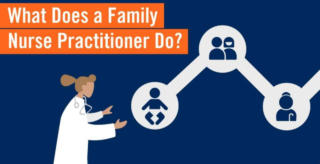
What is a Family Nurse Practitioner
A family nurse practitioner is a Registered Nurse with an advanced degree in nursing. Their training allows them to provide primary care for all ages, including adults and children. Their training includes the diagnosis of common ailments and chronic diseases, treating minor injuries, and ordering lab tests or diagnostic imaging procedures. When necessary, managing chronic conditions like diabetes or asthma, counseling for illnesses like depression or anxiety disorders (and more).
Family nurse practitioners (FNPs) are primary care providers who work with families and individuals of all ages to help them maintain good health. They provide preventative healthcare services, manage chronic conditions such as hypertension, diagnose illnesses and injuries, treat minor emergencies, and more.
Typical Duties
The job duties of a family nurse practitioner vary widely depending on the work setting. They may practice in private clinics, hospital settings, work as part of a medical group, or work at an educational institution like Carson-Newman University.
Although they have been around since the 1970s, FNP roles are being redefined as part of the changing healthcare landscape. FNP roles vary from state to state. Some FNPs work in private practices, while others provide care in various settings such as hospitals, clinics, and schools.
When a patient requires additional care such as physical therapy or surgery, the family nurse practitioner will refer him to another specialist. They also collaborate with primary physicians about their patients’ diagnoses and treatment plans. Because of this close collaboration between medical specialties, they can provide more comprehensive care to their patients.

Infographic designed by: Carson-Newman University






